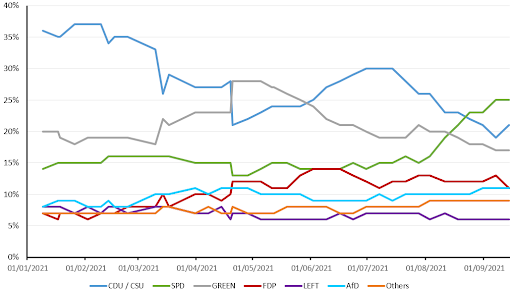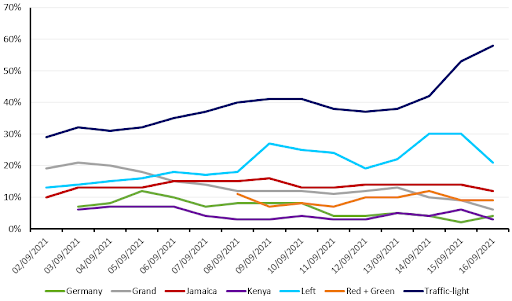What will Germany’s leap into the unknown mean for the euro?
After more than a year of almost exclusively focusing on the pandemic, attention among investors has returned to the more conventional topics of macroeconomics, central bank monetary policy and politics.
FX Market Updates
After more than a year of almost exclusively focusing on the pandemic, attention among investors has returned to the more conventional topics of macroeconomics, central bank monetary policy and politics.The global economic recovery, inflation developments, and monetary policy are key, but both this year and next will see some crucial elections in a number of European countries. First and foremost will be the German federal election set to take place on Sunday, 26th September. Germany is set for a major political shift as Angela Merkel, after almost 16 years of holding the post of Chancellor, will not take part in the election. The Social Democratic Party of Germany (SPD) is also likely to garner the most votes, although is unlikely to form another ‘grand coalition’ with the Christian Democrats (CDU/CSU). The German political landscape has become more fragmented in recent years, as both main parties lost supporters that have instead turned to smaller parties and political movements. The ones that have benefitted, according to the polls, are the Greens and the Free Democratic Party (FDP). The far-right Alternative for Germany (AfD) and the Left have picked up the remaining support. Figure 1: Poll of Germany’s Federal Election [Forsa] (as of 17/09) Source: Wahlrecht.de Date: 17/09/2021
Source: Wahlrecht.de Date: 17/09/2021 Source: PredictIt.org Date: 17/09/2021
Source: PredictIt.org Date: 17/09/2021
 Source: Wahlrecht.de Date: 17/09/2021
Source: Wahlrecht.de Date: 17/09/2021What are the potential outcomes of the election?
Polling currently indicates that the SPD is likely to come out on top, taking approximately 25% of the votes, followed by the CDU/CSU with approximately 20%. The latter was expected to gain the most votes throughout most of the past twelve months, although support for the party has declined from more than 35% at the beginning of the year, in large part a result of a series of PR disasters. One of the relatively recent ones took place during Germany’s floods in July, where CDU/CSU Chancellor candidate Armin Laschet was seen laughing during the President’s speech mourning flood victims. This inappropriate behaviour resulted in public outrage and a further decline in support of the Christian Democrats. Since late-August, most of the polls have indicated that the party is now unlikely to win the most votes. The most likely scenario is that the new German government will include three parties. With both the CDU/CSU and SPD ruling out a potential coalition with the AfD, a combination of five parties could create a coalition. Based on the recent opinion polls, there are five likely three-party coalition scenarios, all of which have been anointed names by the media corresponding to the combination of colours of the political parties:- Germany (CDU/CSU+SPD+FDP)
- Kenya (CDU/CSU+SPD+Greens)
- Jamaica (CDU/CSU+Greens+FDP)
- Traffic Light (SPD+Greens+FDP)
- R2G (SPD+Greens+Left)
 Source: PredictIt.org Date: 17/09/2021
Source: PredictIt.org Date: 17/09/2021




